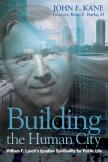William Lynch took philosophy out of the academy.
Ignatian spirituality readily lends itself to personal faith development and works of justice, yet the framework for civic responsibilities occasionally seems difficult to codify. William F. Lynch, S.J., through his deep appreciation of philosophy and political engagement, analyzed 20th-century culture and envisioned an Ignatian stance toward our complex world. His scholarship preferred an extensive evaluation of his own society rather than typical issues within theology and philosophy. Lynch’s spiritual orientation urged finite action in the context of human relationships. John F. Kane, emeritus professor of religious studies at Regis University, describes in detail the unique life of Lynch as he left the Georgetown University faculty and academy to pursue writing as public engagement.
Lynch possessed a deeply incarnational spirituality and criticized religion understood as mere assent to transcendent meaning. For him, much of human understanding arises from our procession through concrete experiences. Lynch had grown up in an Irish immigrant family on Manhattan’s East Side. After matriculating through Catholic grade school, he entered the Jesuits and completed a Ph.D. in classics at Fordham University. He would direct Greek dramas, work in classics at several universities and continually involve himself in the life of the city. Lynch credited St. Ignatius for inspiring his own image of Christ as God’s thorough engagement with the world. He pointed out that faith must have a body; spirituality involves concrete action in time.
Lynch possessed a deeply incarnational spirituality and criticized religion understood as mere assent to transcendent meaning.
Most of his writing was guided by his lifelong appreciation of philosophy, which included an extensive use of Plato. Though he wrote several books and edited Thought, Fordham’s quarterly journal, Lynch would never compose a systematic or fundamental perspective on Catholic life in the United States. As Kane notes, “Rather [Lynch] was in all he wrote concerned to understand, and to help us understand, a number of basic ideas which he saw as crucial or foundational for ability to respond to the challenges of our times.”
Following an overview of his life, each chapter is organized around one of Lynch’s key images for the examination of contemporary society. Kane observes that Lynch often began his public lectures with a particular image, which he then elaborated to explain his ideas. Kane has accommodatingly included Lynch’s complete biography of works, a glossary of terms and a list of abbreviations used. Sections include a consideration of his lifelong writing on the role of the arts, images of hope and faith, a spirituality for public life, the relationship between the secular and sacred and creative new developments in theology. Kane acknowledges that in Lynch’s writing “there is a rarely a simple linear progression in the development of his argument,” nor are there obvious deductions. He disliked absolutized thinking or simple clarities; he therefore led the reader gradually through an investigation of ideas within contexts.
Lynch deplored the divorce of art from reality. He wrote two reflections on aesthetics, The Image Industries, on the state of movies and popular culture, and Christ and Apollo, on literary forms. Instead of offering an imaginative new understanding of our times, Lynch faulted the dramatic arts for a detour “in some romantic or aesthetic haven, or in some ideologically pure ‘walled city’ of separation from the mainstream of the human city.” Films often alternate between disgust for the state of society and an infinite dream. Lynch would certainly not enjoy the proliferation of comic-book films in the past decade. This gnostic turn of aesthetics alienates its viewers from ordinary human experiences instead of providing valuable perspective on our times.
In The Integrating Mind, Lynch identified the polarization of culture as the “Totalistic Temptation.” This inclination brings people “to see most issues and concerns in ‘either-or’ terms, and thereby to embrace simplistic and ‘total’ solutions which regard all opposed or alternative positions as enemies.” With the typical human desire for clear ideas, Lynch describes a temptation to see contraries found in everyday life as absolute oppositions. Strong ideological solutions then emerge for the most complex problems.
Lynch found that the “problem of freedom is not about the goal of freedom, but the far more difficult question of how, in our actual lives and in the life of the city, we move to attain real freedom—how, in other words, we understand the relation of freedom to the contrary reality of limitation.” He warns that the boundless yearning for freedom can result in a loathing for the old self, relationships and country.
Over two chapters, Kane presents one of Lynch’s most penetrating illustrations of culture and freedom: the Dionysian primal desire for all the world offers. Kane shows how Lynch turned to mythology and theater for more fundamental concepts. Dionysian energy seeks both the triumph of individual wishing and will “that feeds as much on fury as on love.” Lynch is most alarmed that these primal desires usually end only in pure and absolute beliefs. While many identify desires of this sort with youth and adolescence, Kane highlights that this passion courses through all sorts of political causes. A proper Christian spirituality holds a hope that shares with others, an imagination that always returns to present realities.
Lynch envisaged modern secularization as a threat to both the sacral imagination and the spiritual.
Lynch envisaged modern secularization as a threat to both the sacral imagination and the spiritual. The secular has grown into “an overwhelming presence in which the religious imagination must learn to exist.” Even though the sacred once provided the predominant inspiration, many features of the modern city result from an entirely secular vision. Kane explains Lynch’s challenging solution for the religious imagination: It must allow the secular to emerge autonomously, while retaining religious truths.
Previous volumes on Lynch did not fully examine his style of pedagogy and combine the totality of his insights on contemporary society. Gerald Bednar has drawn attention to Lynch’s use of analogical imagination for a theology of faith. Francesca Murphy referred to him repeatedly for her own development of Christian aesthetics. Several other authors made use of Lynch’s discussions on secularity and literature. Kane’s study of Lynch surveys his major publications, his vocation to public life and his complicated style of authorship.
Readers familiar with Ignatian spirituality or philosophy will find this book a valuable supplement to current discussions about political discourse, aesthetics and secular society. Lynch frequently objects to ideological opposition, but he does not resolve the gridlock of the two-party system. As he often reminds us, keeping our imagination and faith in contact with reality is perhaps the way forward.
This article also appeared in print, under the headline “A Concrete Faith,” in the October 31, 2016, issue.









